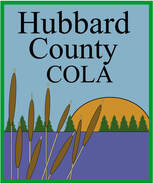
The Shoreland Advisor Program of Hubbard County Coalition of Lake Association
We live in the heart of the waters here in Minnesota. Our lakes, wetlands, streams and rivers face challenges, ranging from invasive species to pollinator decline, and threats to our water quality. Healthy waters begin on our lands. As a private landowner, your planting, care and feeding of the biodiverse native vegetation in the shoreland zone increases the natural aesthetic, provides wildlife habitat and helps water quality. There is a connection between your lawn and the lake or river!
The Hubbard County Coalition of Lake Associations’ Shoreland Advisor Program provides trained volunteers that you may choose to invite to visit with you on your shoreland.
The Shoreland Advisor will walk with you on your shoreland and will listen to your ideas and share insights for your mini-watershed to prevent runoff, erosion and promote water quality.
The Shoreland Advisor visit is typically less than an hour. After researching questions and potential opportunities, a visit recap is shared with you via email for your reference.
This coaching concept also applies to your urban or country lawn. We all live in a watershed!
The Shoreland Advisor program is a free educational service of HC COLA. To invite a visit by a Shoreland Advisor, please email: hccolamn@gmail.com
Based on availability, a member(s) of the Hubbard COLA Shoreland Advisor team will then arrange a visit with you on your mini-watershed, your shoreland!
The HC COLA Shoreland Advisor Program began in September 2020 when Hubbard County University of Minnesota Extension and Hubbard County Coalition of Lake Associations (HC COLA) sponsored two workshops on ‘Lawns & Lakes – There is a Connection! Recordings can be found at: http://www.hubbardcolamn.org/presentations.html . The workshops were developed and taught by Karen Terry, retired Water Resource Management, UMN Extension who also prepared curriculum and trained Shoreland Advisors in 2019 for Itasca County. Guest speaker, University of MN Extension Master Gardener Keith Manlove provided his insights in the workshops